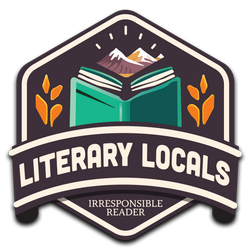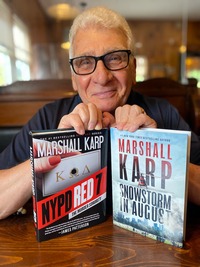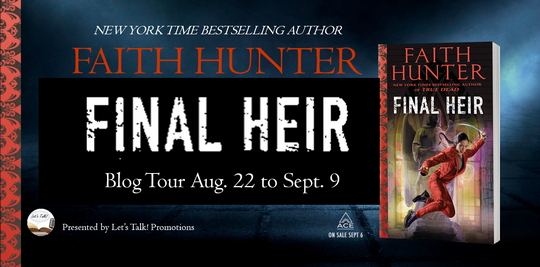
I’ve got a chat with Children’s Book Writer/Illustrator Jeremy Billups today. I love Jeremy’s stuff—some of his artwork has popped up here over the last year. I have enjoyed and blogged about his three books and am eager to see what’s next from him. But for now, am excited to share this with you. Hope you enjoy!
Before we get into things, why don’t you give the reader a brief introduction to you and your work.
Ok, sure. Let’s see. I’m Jeremy. I live in Boise, Idaho with my family. I’ve written three children’s books so far, Bearded, Bearded Too, and Sea This and Sea That. I’m currently working on two new children’s books that I hope will be out at some point in 2023. I’m also working away on some comics that I’m super excited about. Should I share the titles of the new stuff? Or should I keep them a mystery?
If anyone is interested in buying my books right now, I’ve made it super tricky. I decided to stop selling on Amazon. I took down my personal website and am in the middle of building a new website that will serve as the exclusive home to all my stuff. I’m hoping to launch the new site soon. So, really the only way to buy my books is directly from me, and I’m a terrible salesperson. Haha.
For the announcement of the new site you can follow me on Twitter at @jeremybillups.
You should share the upcoming titles. I won’t publish them if you don’t want me to, but you should share 🙂
Okay! I’m having a hard time keeping it all secret, anyway. I’ve decided to add a third book to the Bearded series. Bearded Tree should be out this upcoming Summer. And, I’ve been trying to finish a Christmas book that I’m currently calling, Caroline, Caroling. I would love for that to be out next October. The comics I’m working on are Tales of the Incredible and Squirrel E. Jones. They’re very different from each other, but both are a lot of fun.
Are you a native Idahoan? What is it about Idaho that keeps you here?
Yep. Born and raised. I grew up in the small town of Weippe in North Central Idaho. Very small town when I lived there and even smaller now. My parents still live there so I still get to visit at least a couple of times a year.
And, I love Idaho and the Treasure Valley. With family and friends here, it’s hard to imagine living anywhere else.
Just to be on the safe side, you want to tell non-Idaho readers how to pronounce Weippe? Am sure growing up that you heard all the jokes… (but probably didn’t make any of them yourself)
Good call! Weippe is pronounced like “We Hype”. I have definitely heard all of the jokes and still do. I’m guilty of making some of my own jokes too. 🙂
Are you tied into some sort of local author/bookish group/culture? If so, tell us about it and how it helps you as an author. If you’re not, is there a reason for it?
Yes and no. I was meeting with one of my friends from college once a month to talk about current projects, critique each other’s work, and motivate each other to keep pushing to get better. That was going really well, until we both had kids. Haha. Now we email back and forth when we can.
I was also in SCBWI (Society of Children’s Book Writers and Illustrators) for a while and participated in a couple of events, but that was hard because at the time I was a member they lumped Southern Idaho in with Salt Lake City and all the really exciting events were down in Utah. Considering the event fees, hotel, gas and travel time – it was hard to get down there. I’m not sure if they’re still lumped together. I should probably check because SCBWI is a great organization.
I guess this is a good time for me to share some news along those lines. With my new website, I’m also launching a Discord server. I’m hoping that it turns into a small online community where people can share, critique, learn, have fun, and ultimately grow creatively. If anyone is interested, the server is already open. Here’s the link: https://discord.gg/9DYb8GWFVr
What kind of events in the area do you attend—either to sell/promote your books or to network with authors? Are there any outside of this area that you hit regularly and wish we had something like it here?
I absolutely love the Boise Comic Arts Festival! It’s always so much fun and such a positive energy. I always walk away from that event recharged and excited to make new stuff. Plus, that’s where we met! I wasn’t able to attend this year because of my day job but I’ll definitely be there next year.
I also enjoy selling at small Holiday Bazaar events at local schools. And, I’ve done a couple local school/library visits. They’ve been good options for children’s books.
I haven’t been to one yet, but there are some great children’s book festivals around the country. I would also love to see a children’s book festival here in the Treasure Valley. Oh man, now you have me pondering whether or not it would be a good idea to start a festival like that here. Should I do that?!
The Boise Comics Art Festival was interesting this year—having it in the Zoo added a nice bit of flair (but the downside was that you had to wander around a lot to see everything, and we were never sure if we had). Are there some sure-fire Bazaar events that authors/readers should check out, or does it vary from event to event, year to year?
I saw some pictures online of this year’s Festival. I’m very bummed I missed the Zoo. I did wonder about the “artist alley” experience. Definitely not the typical approach. I wonder if they’ll have it at the Zoo again next year.
Other than the Boise Comic Arts Festival, it tends to vary from year to year for me. Gem State Comic Con is one that I’ll be checking out in April. If it’s not too late, I should probably look into getting a table there.
I’ll also mention The Cabin (thecabinidaho.org). They have excellent events, activities, and workshops all throughout the year. I think they’re a tremendous local resource for both readers and writers.
Back to your idea of starting a children’s book festival, personally, I’m game for any book festivals I can get to 🙂
Good to know! I’m definitely putting it on my list of things to ponder. I imagine it would be a lot of work to put on, but I think it would be something that could be a lot of fun for years to come!
(you might want to see what Devi Walls said about that last week)
What’s the breakdown of your audience—do you have a strong local base, or are your readers from other parts of the world?
Through the power of Amazon, I definitely have more readers across the nation and world than I do locally. I was pretty intimidated, still am, with selling face-to-face so I thought selling on Amazon would be the best place for me to start. I have no complaints with starting there, but I did finally come to realize the power of local, not just for selling, but for meeting people and growing relationships. I finally started participating in local events a few years ago. I’m so glad I did.
Do you have solid plans (as much as anything can be solidly planned) for expanding locally, or are you more at a “throw it at the wall and see what sticks” point?
My big focus at the moment is to get my website squared away. Once that’s done, I’ll take a fresh look at expanding locally. There are a lot of farmer’s markets here in the valley that I’ve been looking into. I think they could be a really good next step toward growing my local audience.
I think that could work pretty well.
Do you think there are particular challenges or advantages to being a writer in the Treasure Valley? (possibly both)
Compared to where I grew up, there are definitely advantages. Events, activities, resources, and communities of like-minded people with similar aspirations are easy to find here.
Nothing against Weippe, but I bet!
Do you bring Idaho (or some sort of Idaho-sensibility, assuming one exists) to your work? Whether or not anyone else sees it, can you look at some aspect of your writing and think “That’s Idaho” or “I would do ____ differently if I was a Kentuckian or from Illinois?”
So far I’ve been deliberate about leaving Idaho out of my work. But now I’m wondering if that’s the best approach. Have you ever watched a cartoon by the name of Bluey? It’s an amazing show about a family of dogs that live in Australia. The show is made in Australia and is VERY Australian. Watching the show from an outsider’s perspective, I’ve come to really enjoy the little peeks into Australian life and slang. By the way, did you know that Australian slang for toilet is “dunny”? Haha.
That could work really well—assuming there’s a local slang.
Definitely going to explore this. I think it could be a lot of fun.
Is there a book (or two…or 18, if you get really carried away), that embodies Idaho/the Idaho spirit to you?
Growing up here in Idaho, I was introduced pretty early on to the Idaho and Ernest Hemingway connection. That connection led me to reading A Farewell to Arms which was followed up with me reading anything and everything written by Hemingway that I could find. There was something about the unadorned style, subject matter, and time period of his writings that really resonated with me. In a lot of ways, it’s like reading about the romanticized version of Idaho that I have in my head.
Thanks for your time and participation! Hope you enjoyed it!
Thank you for taking the time to chat! It was a lot of fun!







